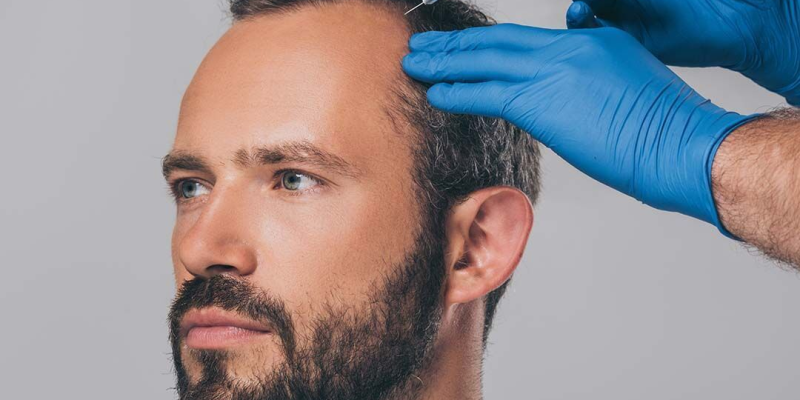Hair loss is a common issue that affects millions worldwide, significantly impacting an individual’s self-esteem and social dynamics. In Portsmouth, a revolutionary solution has emerged in the form of hair restoration injections, offering a promising alternative to traditional methods like surgery or topical treatments. These injections are minimally invasive, involving the use of substances that stimulate the natural regrowth of hair.
The principle behind hair restoration injections is to harness the body’s own regenerative capabilities. Active ingredients are injected directly into the scalp, where they can enhance the health and function of the hair follicles. Unlike extensive surgical procedures, this treatment is quick, involves minimal discomfort, and requires little to no downtime, which makes it an attractive option for many suffering from hair loss.
As we delve further into this topic, we will explore the types of injections available, the science behind them, and the real-life results people in Portsmouth are experiencing. This innovative approach is not only changing lives by restoring hair but also confidence and the pleasure of a youthful appearance.
Exploring the Science Behind Hair Growth
Hair growth involves a complex interplay of genetic, hormonal, and environmental factors. The hair follicle, a dynamic organ, goes through cycles of growth, regression, and rest. Hair restoration injections work by targeting these hair follicles, particularly those in the growth phase. The science behind these treatments revolves around cellular signaling and the stimulation of hair follicle stem cells to promote new growth.
Key ingredients often used in these injections include growth factors, peptides, and sometimes, platelet-rich plasma (PRP). These substances are known to boost blood circulation, improve follicle health, and increase the thickness of the hair shaft. By addressing the underlying issues of hair thinning and loss at a cellular level, these injections offer a biologically integrated treatment solution that aligns naturally with the body’s own healing mechanisms.
Moreover, ongoing clinical studies and research in trichology are continually refining our understanding of hair loss and regeneration. This scientific backing not only improves the efficacy of treatment but also enhances the safety profiles of the various substances used in hair restoration injections, ensuring that patients receive the most advanced care available.
Types of Hair Restoration Injections Available
In Portsmouth, those looking into hair restoration injections have several options to consider. The most prominent and widely used is Platelet-Rich Plasma (PRP) therapy, which involves extracting a patient’s own blood, processing it to enrich for platelets, and then re-injecting it into the scalp. This method utilizes growth factors present in the patient’s own blood to stimulate hair growth naturally.
Another innovative type involves stem cell injections, where stem cells are harvested either from the patient’s body or a donor source, and injected into the hair follicles. This method is particularly promising due to its potential to regenerate not only the hair but also the health of the scalp. Additionally, patients in Portsmouth also have access to treatments using biomimetic peptides, which mimic growth factors and can enhance hair follicle activation without the need for extracting bodily substances.
Each type of injection has its unique approach and mechanism of action, and a skilled practitioner can help determine the most appropriate treatment based on an individual’s specific condition and health profile. The choice of treatment typically depends on the extent of hair loss, the patient’s medical history, and their personal preferences.
Step-by-Step Process of Treatment in Portsmouth
The process of receiving hair restoration injections in Portsmouth begins with a detailed consultation. A qualified trichologist or dermatologist will assess the patient’s hair loss, discuss their medical history, and explain the various treatment options available. This initial consultation is crucial for building a tailored treatment plan that addresses the individual’s specific needs.
Following the consultation, the treatment itself typically takes place over multiple sessions. For instance, PRP therapy often requires three sessions spaced about a month apart to achieve optimal results. During each session, the scalp is first numbed with a local anesthetic to minimize discomfort, and then the prepared solution is carefully injected into the areas of the scalp where hair thinning has occurred.
After the treatment, patients can usually return to their normal activities the same day, although they may be advised to avoid strenuous activity and direct sunlight for a short period. Follow-up visits are scheduled to monitor the progress of the treatment and make any necessary adjustments. The gradual improvement in hair density and texture can often be observed over the following months as the hair grows naturally.
Expected Results from Restoration Injections
Patients opting for hair restoration injections in Portsmouth can anticipate progressive improvement in their hair’s density and overall health. The results typically begin to become apparent after a few months, as the natural hair growth cycle takes time to manifest visible changes. Most individuals observe a decrease in hair shedding, followed by an increase in thickness and coverage in areas previously thinning.
The effectiveness of these treatments often depends on factors like the age and health of the patient, the extent of hair loss, and the specific type of injection used. For instance, PRP therapy has shown excellent outcomes in individuals with alopecia areata or those experiencing hair thinning rather than complete baldness. Results can be enhanced when combined with other treatments such as nutritional supplements or topical applications that support hair health.
It is important for patients to have realistic expectations and understand that results can vary. Continued treatment sessions might be necessary to maintain the gained hair density, and practitioners typically recommend periodic reviews to assess the long-term success of the treatment.

